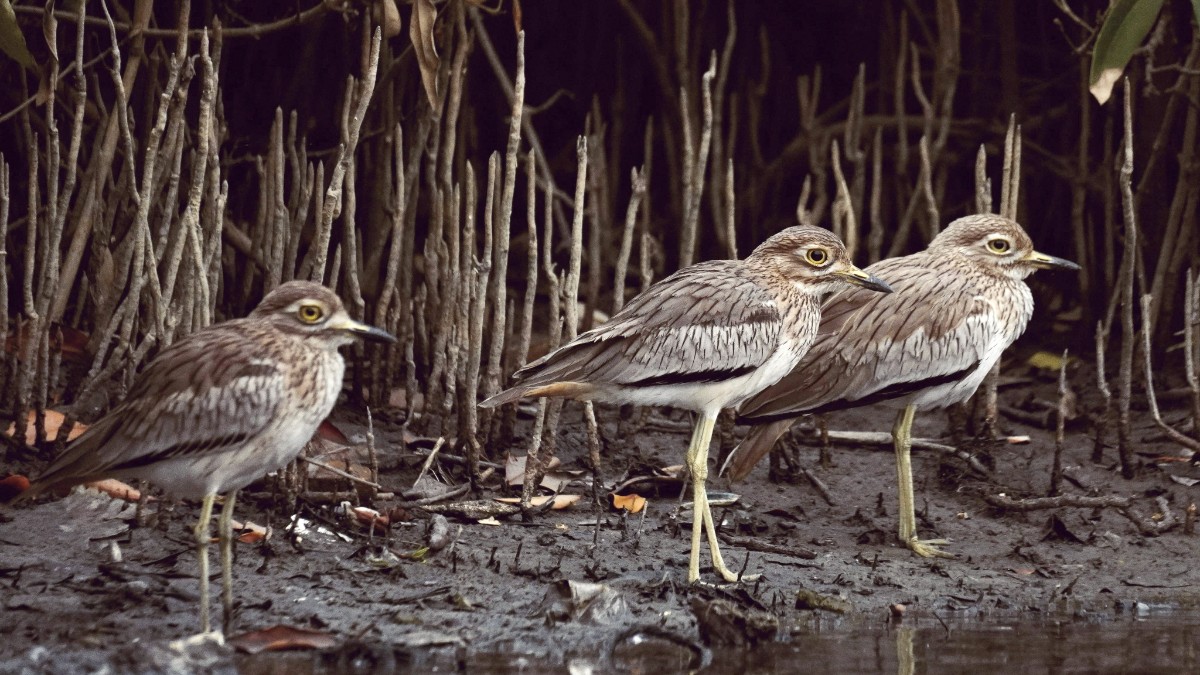
The Gambia
The Gambia's weather patterns remain largely consistent, making conditions predictable. The Dry Season (November to May) brings warm to hot temperatures with very low humidity. Daytime temperatures typically range from 25°C to 30°C (77°F to 86°F), conditions pleasant for outdoor activities. Nights are cooler. Virtually no rainfall occurs. From December to February, the Harmattan wind blows from the Sahara, carrying fine dust. This wind can slightly reduce visibility and cause a minor temperature drop, making mornings and evenings cool.
The Wet Season (June to October) is hot and humid, characterized by significant rainfall. Rain mainly falls in short, heavy downpours or thunderstorms, often in the late afternoon or evening. Average daytime temperatures range from 30°C to 34°C (86°F to 93°F). Humidity levels remain high, often exceeding 80%. Rainfall peaks in August and September.
The wet season is driven by the West African Monsoon, which brings the heavy, but often brief, downpours. The Gambia is not in a hurricane-prone region; tropical storms are not a concern here.
Temperatures reach above 35°C (95°F) in April and May, especially in inland areas. These months necessitate careful hydration and avoidance of strenuous activities during midday.
Peak Comfort, More Crowds
Cooler temperatures, low humidity, no rain. Ideal for beach, exploration, wildlife. Migratory birds arrive.
Accommodation and flight prices peak. Tourist areas experience more visitors. Booking well in advance recommended.
Fewer Tourists, Varied Weather
Fewer tourists, potentially lower prices. March-May presents good weather before heavy rains. October is lush green.
March-May very hot, inland temps exceed 35°C (95°F). October still has residual humidity and occasional rain.
Great Value, Rainier Conditions
Significant savings on flights and accommodation. Lush green landscape. Excellent time for birdwatching. Fewer crowds.
High humidity and heavy rain showers disrupt plans. Unpaved roads impassable. Mosquitoes more prevalent.
Citizens of ECOWAS (Economic Community of West African States) member states do not require a visa for stays up to 90 days. This applies to most West African nations.
Citizens of many Western countries, including the United States, United Kingdom, Canada, Australia, and most European Union countries, generally obtain a visa prior to arrival. Apply through Gambian embassies or high commissions. Process typically completion of form, passport submission, photos, and fee payment. Allow sufficient time.
Valid for at least six months beyond your departure date.
(If required) Valid visa in passport or official approval. Check VisaHQ for details.
Typically two to four recent passport-sized photos for visa applications.
Immigration officials may request evidence of planned departure.
Address of your intended stay, like a hotel reservation.
Costs vary significantly based on your travel style, from budget-conscious adventures to luxury escapes.
Here are approximate daily cost ranges, converted to USD for comparison (exchange rates fluctuate).
A breakdown of luxury travel and specific item costs.
Approximate costs for travel components.
| Category | Item/Range | Cost (GMD / USD est.) |
|---|---|---|
| Accommodation | Hostel Bed/Basic Guesthouse | GMD 500-1,500 ($8-$25) |
| Mid-range Hotel Room | GMD 1,800-4,000 ($30-$65) | |
| Luxury Resort Room | GMD 6,000-15,000+ ($100-$250+) | |
| Meals | Street Food/Local Eatery | GMD 50-250 ($1-$4) |
| Mid-range Restaurant Meal | GMD 400-1,200 ($6-$20) | |
| Fine Dining Meal | GMD 1,500-4,000+ ($25-$65+) | |
| Transportation | Shared Taxi (short distance) | GMD 10-30 ($0.15-$0.50) |
| Private Taxi (short distance) | GMD 100-300 ($1.50-$5) | |
| Airport Taxi to Kololi/Banjul | GMD 700-1,500 ($11-$25) | |
| Attractions | Museum Entry | GMD 100-300 ($1.50-$5) |
| Nature Reserve Entry | GMD 200-500 ($3-$8) | |
| Boat Trip (e.g., Birdwatching) | GMD 1,000-3,000 ($15-$50) |
Be informed about precautions and available resources.
Mandatory vaccination for travelers 9 months and older. Present certificate upon arrival.
Stick to Bottled water; avoid tap water.
Healthcare facilities are basic, notably outside Banjul and main tourist areas.
Royal Victoria Teaching Hospital (RVTH) in Banjul is the largest public hospital. Private clinics, like Medicare and Westfield Clinic in Serrekunda, generally stand with better standards of care but carry higher costs. For serious medical conditions, medical evacuation to a country with advanced facilities often becomes necessary.
Pharmacies are available in urban areas, but specific medications may be limited or out of stock. Bring sufficient supplies of any prescription medications you require, along with a copy of your prescription and a doctor's letter. Emergency response services are limited and can be slow.
Emergency Numbers: Police: 117, Fire: 118, Ambulance: 116
Coverage for hospital stays and necessary treatments. Essential for serious conditions. Consider World Nomads.
Coverage for medical evacuation to another country if required. This cost can be very high. Look at SafetyWing.
Cancellation, interruption, lost/stolen luggage, and personal belongings coverage. Explore Insubuy.
The Gambia is generally safe for tourists, but petty crime is common. Awareness and precaution are helpful.
Remember these points for efficient budgeting.
Forex bureaus typically offer better rates than hotels. Avoid changing money in unofficial places.
Practice respectful bargaining in markets and for private taxi fares. Start low and meet in the middle.
Purchase a local SIM (Africell, Qcell, or Gamcel) for mobile phone use; it is cheaper than international roaming.